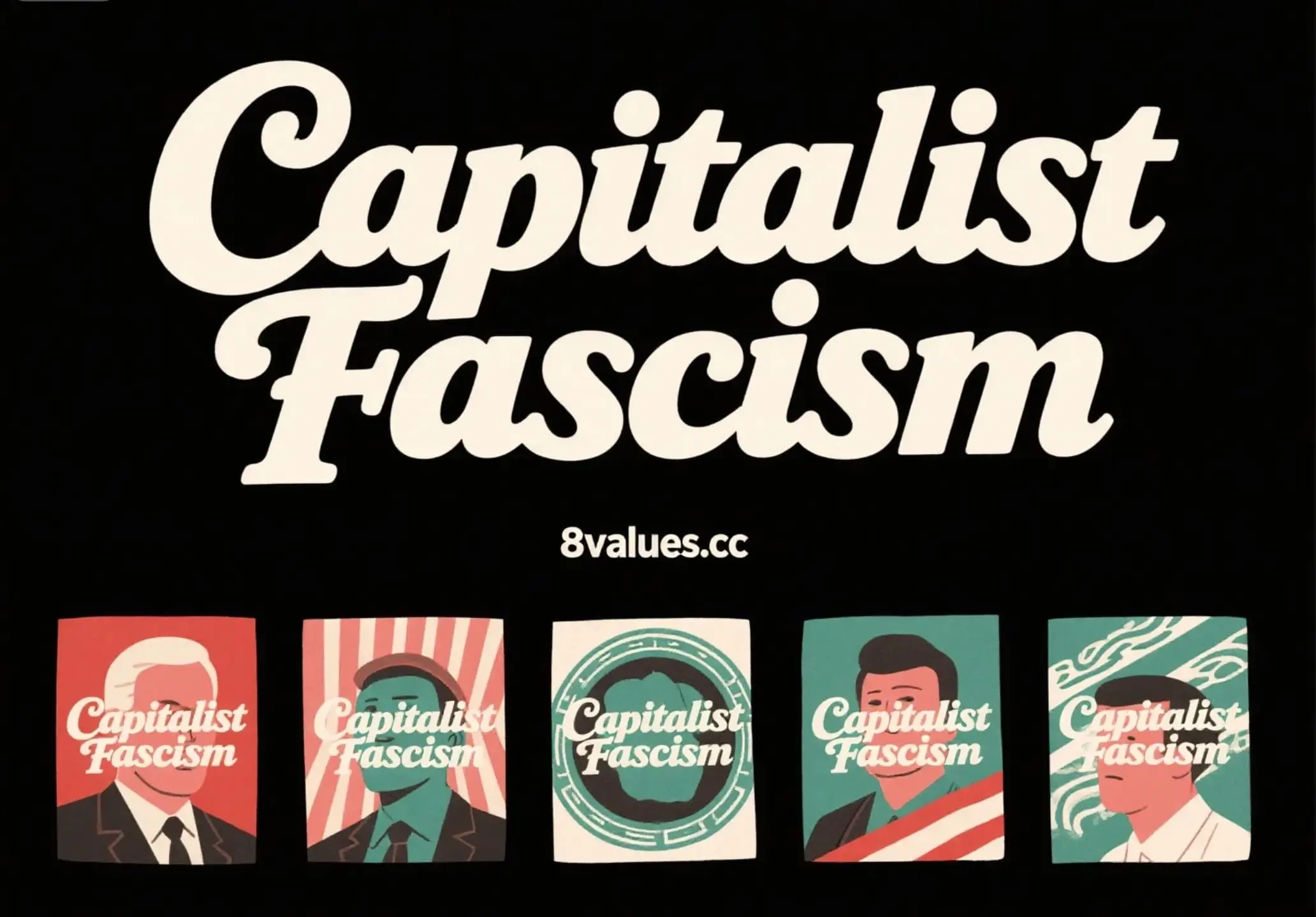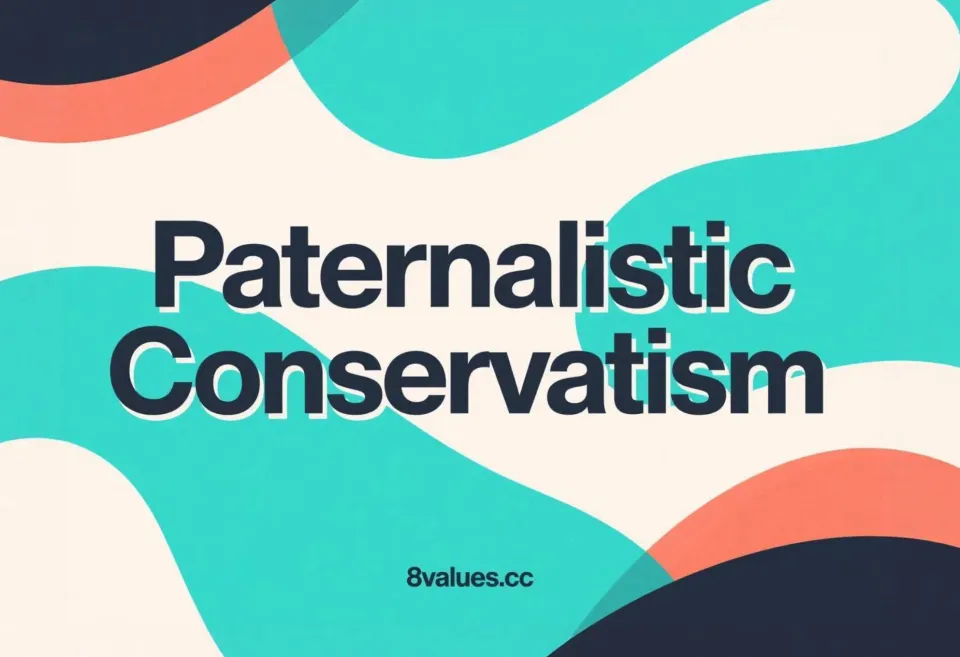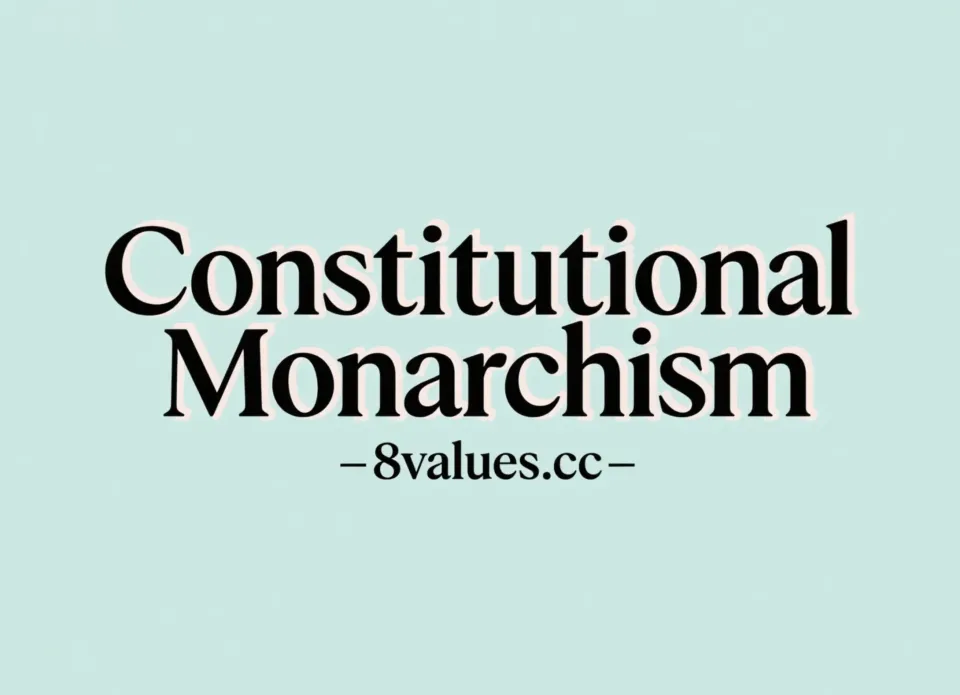Capitalist Fascism | 8values Interpretation of ideological ideology of political tests
Capitalist fascism is a political ideological result in the 8Values test. This article analyzes its historical origins, economic characteristics, ideological logic and modern revelation in detail, helping users understand the political and economic system intertwined by extreme nationalism and capitalism, and provides 8 values testing and related political tendency analysis tools.
In the 8Values political values test, Capitalist Fascism is a unique ideological test result used to describe a political and economic system that combines capitalist economy with fascist political characteristics. This concept is not a strictly academic definition, but is often proposed by left-wing or anti-capitalist theorists to criticize the extreme practices of certain states or regimes in economic, political, and social control.
It emphasizes the high integration of the state and capital, extreme nationalism and authoritative political model, while maintaining the basic principles of capitalism. This ideological result reminds users to pay attention to the complex interactive relationship between political power, economic interests and social control.
The term composition and core concept of capitalist fascism
"Capitalist fascism" consists of two core concepts:
- Capitalism : an economic system with private ownership, market freedom and profit-driven as the core, emphasizing the economic rights of individuals and enterprises, while also generating class differences and social stratification.
- Fascism : Extreme nationalism, authoritarianism, anti-democratic political ideology, emphasizing state or race supremacy, suppressing dissent, promoting leader worship, and achieving political goals through militarization, propaganda and social control.
Combining the two, capitalist fascism is reflected in the integration of capitalist economic structure and fascist political model : the state has a high ability to control the economy and society, but private property and corporate freedoms still exist on the surface. This combination often occurs during times of capitalist crises or social unrest to protect vested interests and maintain social order.
For an in-depth look at the political spectrum and economic dimensions of the 8Values test, visit the 8Values online test .
The historical relationship between fascism and capitalism
Scholars generally believe that fascism can be regarded as a special political response to capitalism in crisis , not a complete rebellion against capitalism, but a political strategy that emerged in order to maintain and reproduce the capitalist system in a specific environment.
- Basic Principles of Protecting Capitalism : Fascist regimes generally do not question capitalist private ownership, but protect capital accumulation by suppressing labor and political dissent.
- Responding to class conflicts and social crises : Fascism is often in the period of middle-class panic, active workers' movements and political polarization, and the ruling class maintains order through fascist means.
- Instrumental and Opportunism : Historical Nazism and Italian fascism show strong utilitarianism and opportunism in economic policy, selectively adopting elements of capitalism and corporatism to achieve political goals.
For more analysis of 8Values political dimensions and economic types, please refer to 8Values political spectrum .
The economic characteristics and policies of fascism
Despite the fascist regime's intervention in market mechanisms, private property and corporate freedoms remain . The economic characteristics of capitalist fascism are mainly manifested as:
- Private enterprises under the leadership of the state
- Italian fascism established a social economic system, and the state regulated various economic sectors. Although enterprises were privately owned, they were strongly guided by the state.
- Nazi Germany combined capitalism with state ideology, industry and trade were strictly controlled, and the economy was used for political and military purposes.
- Suppressing labor and enhancing corporate interests
- Trade unions and independent labor organizations were destroyed, strikes and bargaining rights were cancelled, and workers were exploited.
- Wage cuts, rising living costs and deteriorating working conditions have enabled enterprises to make more profits.
- Economic self-sufficiency and militarization
- Economic policies emphasize domestic production, restrict imports, and encourage self-sufficiency.
- Large-scale military spending and public works have become tools to stimulate the economy and combat readiness.
- Privatization and State Support
- The state protects capital returns through subsidies, tax incentives and investment risk as well as exerts political influence on enterprises.
- Forced labor
- During the Nazi Germany and Italy fascist period, industrialists rented prisoners and prisoners, becoming an integral part of the national war economy.
For more information on the 8Values economic dimensions, please visit the 8Values Political Spectral Coordinate Analysis .
Ideology and propaganda mechanism of capitalist fascism
Capitalist fascism is not only a combination of economic structures, but also a far-right political ideology:
- Nationalism and racism : National and national interests are higher than individuals, and class contradictions are transferred to external or imaginary enemies.
- Leader worship and state supremacy : emphasizes loyalty to absolute leaders and individual obedience to national goals.
- The "third road" myth : propaganda is neither laissez-faire capitalism nor socialism, but a unique model of strong state intervention and capital protection.
- The false cloak of socialism : For example, the national socialism in Nazi Germany did not actually weaken private property, but instead strengthened the interests of the ruling class through state intervention.
To learn more about the 8Values ideological types, please refer to the 8Values ideological interpretation .
Fascist supportive class cooperation with political elites
The rise of fascism is often supported by capitalist elites:
- Fear of communist threats : Great landowners, industrialists and bankers support fascist means to suppress the workers' movement.
- Political elite cooperation : For example, Mussolini and Hitler came to power through conservatives, kings or presidents, law enforcement agencies suppress the left and show tolerance to fascism.
- Financial and economic support : German large enterprises provided financial support in the early days of the Nazi Party to ensure return on capital.
Comparison between capitalist fascism and other political and economic systems
- Liberal Capitalism : Fascism criticizes laissez-faire capitalism’s materialism and individualism, but does not abolish capitalism itself.
- Socialism and Communism : Fascism is opposed to socialism in the political spectrum, and its core is to safeguard the interests of the monopoly bourgeoisie.
- Authoritarianism and the far-right : Capitalist fascism emphasizes social conservatism, nationalism and the use of authoritarian means to oppose egalitarianism.
Contemporary Criticism and Real Inspiration
The rise of the global far-right movement today has made the concept of capitalist fascism still have reference value in real politics:
- Responding to the Capitalist Crisis : The crisis of legitimacy in modern states and social inequality provide political opportunities.
- Neofascist tendencies : Some leaders and their movements are labeled as "neofascist", such as Trump, Bolsonaro and the Brexit movement.
- Class anger transfer : Maintain elite rule by directing class contradictions and social dissatisfaction to alternative goals (such as immigration).
Criticism and controversy of capitalist fascism
- Historians have different opinions : There is still controversy over whether capitalist fascism is a coherent economic policy.
- Instrumental view : It is regarded as a political tool under the crisis of capitalism, not an idea of independence.
- The nature of mixed economy : The state has unprecedented intervention in the economy, but still maintains private property rights. The core question is "who is beneficial to it."
- Derogatory Characteristics : In the political spectrum, it is often used to refer to perceived authoritarianism and political evil.
Summary and Inspiration
Capitalist Fascism is a far-right ideology of the integrated capitalist economy and fascist politics . Through comprehensive state intervention, suppression of labor, and promotion of extreme nationalism and militarization, it protects the interests of the ruling class. It is not only a historical phenomenon, but also an important reference for understanding modern far-right political and authoritative trends.
To explore your position on the 8Values political spectrum and learn more about the test results, take the 8Values online test now .






